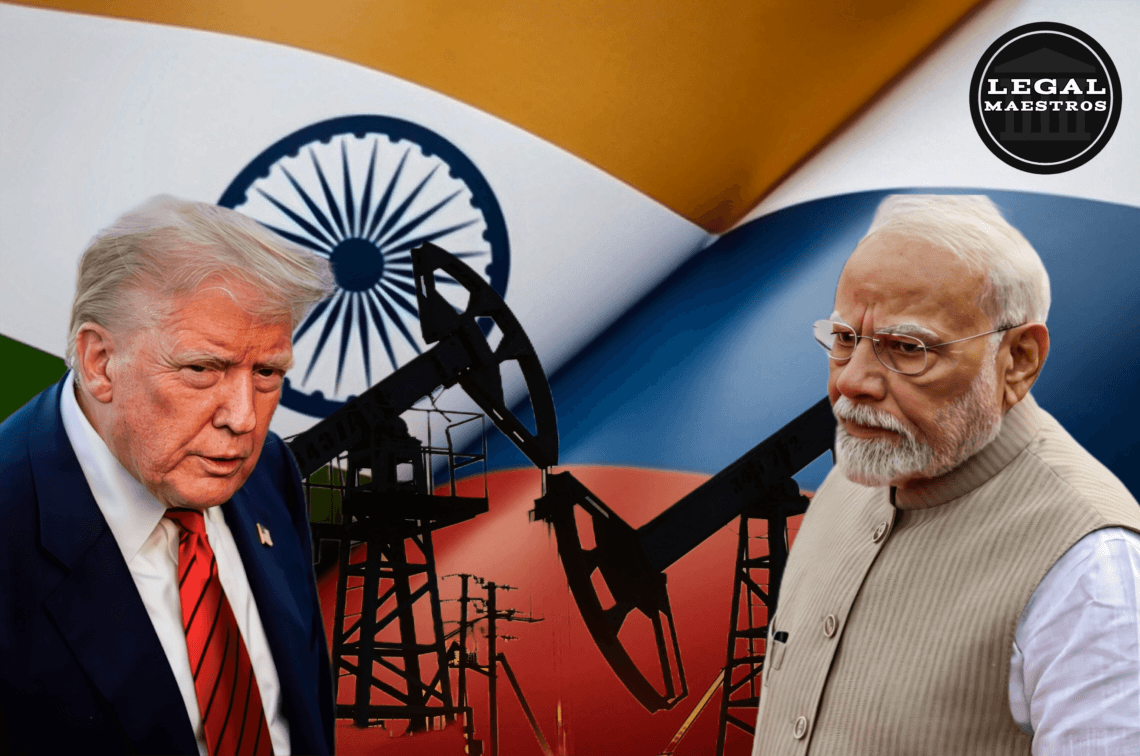
Trading in Russian oil is one of the key issues that have been mooted in the multifaceted and quite controversial sphere of global relations, particularly as a result of the outbreak of the war between Russia and Ukraine. With the United States, headed by President Donald Trump, threatening to impose new tariffs and the European Union imposing its sanctions, the question, which is of utmost importance, is how the Russian oil trade of India corresponds to the norms of the international order, and what is the legal and sovereign foundation of such cooperation?
This essay seeks to give a clear and detailed insight of the legal and practical basis of the Indian stand with a view of trying to understand why its actions are considered to be legitimate and proper in the own eyes.
The International Legal Framework by which India Arguably stands: The Legality of India Position
Legally, there is nothing wrong in India buying Russian oil. This is the case since the sanctions with respect to Russia by the U.S. and the EU are either unilateral or multilateral, but never global. Another important difference between international laws is that of sanctions applied by an individual nation or even a combination of nations and those authorized by the United Nations Security Council (UNSC).
- UN-Mandated Sanctions: The UNSC can impose UN-mandated sanctions that are legally binding on all members of the UN charter (Ch.VII of the UN Charter). These sanctions have been universally accepted as validations to preserve or rein state international peace and security.
- Unilateral Sanctions:Sanctions On the Energy Sector of Russia are not UN mandated. They are a political and economic decision of the U.S., the EU, and other countries of which the ideas coincide. Although these countries have the prerogative of taking such actions in their legal framework, they cannot lawfully force other sovereign states e.g. India to adhere to them.
India is an independent country and is not obligated, under law, to comply with sanctions other than those passed by UNSC. Its trade with Russia is a bilateral issue and legally speaking, it has a right to trade with any nation so long it is not acting against any resolutions, which are binding internationally. This has been constantly insisted upon by the Indian government that its actions are based upon its national interests and are not determined by its foreign policies of other countries.
The crux of the Indian position on the issue is National Interest and Energy Security:
In addition to the legal technicalities, the stance of India has a strong ground of the national interest of the nation, i.e. its demand of energy security. Being the third-largest oil consumer and importer in the world, India depends on foreign suppliers to cater to a large part of its energy demands. Russia-Ukraine conflict and the global market changes due to this conflict gave a great opportunity and an irresistible need to India.
- Discounted Oil: Driven by the fact that the western states had abandoned Russian oil, Russia set huge price cuts. With a growing economy coupled with the fact that the population was increasing, India saw this as a means of getting cheap crude oil. This was neither a political support of the activities of Russia but a realistic economic choice to regulate its energy import bill and inflation control.
- Market-Based Reasoning: Indian government repeatedly blurred that it intended to acquire oil because of the market considerations and to secure energy supplies of its citizens of 1.4 billion. This implies that Indian refiners (private and state-owned) decide on what is most economical to them. They are not following a political order to be in favor of Russia.
- Secure Supply: India has very low oil imports with Russia and this was before the war. Nonetheless, when the other traditional Middle East suppliers changed their focus of exportation to Europe to plug the hole that the sanctions had created on the continent, the level of Indian reliance on Russian oil became more than 35 percent of the total imports. The move was influenced by the changing supply chains across the globe and the necessity to hold a stable and diverse supply of energy.
The Question of the “Greasy” Practices and Polished Goods
India has also spoken out against what it sees as a form of so called “double standards” by its detractors. Indian Ministry of External Affairs has indicated that most of these countries with which India is criticized are still doing a lot of business with Russia such as energy and other strategic commodities. To take one example, the EU is importing Russian liquefied natural gas (LNG), uranium and other commodities.
The concern of India importing crude oil, though important, is not the only aspect of the U.S. and EU worry since it is also true that Indian refiners refine such imported crude and sell the product (such as diesel and jet fuel) to Europe and other markets. This is not an illegal practice at all. According to this international rule regarding substantial transformation, once, the crude oil becomes another country after it has been refined into another product, the country of origin transforms. Consequently, the refined goods that India exports is not Russian rather Indian and it does not receive sanctions of the type. This has enabled the European states to gain the products of the Russian crude indirectly, which the critics claim is against their own sanctions.
Tariffs Scourge, Legal and Economic Investigation
The threat announced by Donald Trump to increase by significantly higher tariffs the cost of goods produced in India is of a different color. Tariffs form part of the trade policy and nations are entitled to charge tariffs on imports of foreign goods. But the practice of using tariffs as punishment to the foreign policy decisions of a country, in this instance, the oil trade with Russia is disputable.
- Unilateral Action: The United States is not bound by its legal right to issue tariffs in its own trade laws. Nevertheless, this may be considered as an aggressive and unilateral action taken to penalize a nation on the trade relationship which is not a violation of the international law.
- Global Trade Effects: This action could result in a trading war that is not only between the two countries, the U.S and India but also with other nations who are purchasing Russian oil. This may result in the fragmentation of the global trading into various political blocks, which will cost people more and become less efficient.
- Indian reaction: India has unequivocally declared that it will not succumb to these types of pressures and will do whatever it takes to safeguard its national interests as well as its economic security. Its government has been reiterating that it has foreign policy and trade decisions that are made as per the requirements made by its people and their strategic independence.
the Attribute of Sovereignty, and the Pragmatism of its Practice
To summarize the proceedings, the trade of India involving Russian oil is anchored in a fine combination of international law framework and logical examination of the national interests. The established specificity of the legal system regarding unilateral sanctions does not present an obligatory condition on India, and the state energy deficit dictates the need to buy discounted Russian oil as a national economic necessity. The U.S. and the EU could also consider this trade in the context of their foreign policy interests but India would regard this as a realist and independent choice. The Diplomatic tensions and the threat of tariffs also signal an increased risk of an economic interdependent globalized world in conflict with nationally based geopolitical competition. In the case of India the message is straightforward: its security interests, both of energy and strategic independence, take precedence, and that is not only legally and practically correct, but practical necessity of a country of its size and aspiration.






1 thought on “How India’s Russian Oil Trade Complies with International Norms Amid Trump’s Tariff Threats and EU Sanctions”